The Nearest Read online
Begin Reading
Table of Contents
Copyright Page
Thank you for buying this
Tom Doherty Associates ebook.
To receive special offers, bonus content,
and info on new releases and other great reads,
sign up for our newsletters.
Or visit us online at
us.macmillan.com/newslettersignup
The author and publisher have provided this e-book to you without Digital Rights Management software (DRM) applied so that you can enjoy reading it on your personal devices. This e-book is for your personal use only. You may not print or post this e-book, or make this e-book publicly available in any way. You may not copy, reproduce, or upload this e-book, other than to read it on one of your personal devices.
Copyright infringement is against the law. If you believe the copy of this e-book you are reading infringes on the author’s copyright, please notify the publisher at: us.macmillanusa.com/piracy.
1
Kate heard a knock on the open door of her office, and looked up to see Anneke from dispatch, grimacing apologetically.
“I’ve got a shocker for you, Sarge. Sorry.”
Kate said, “Go ahead.” She’d been back from maternity leave for two weeks; she did not need a content warning for every case that was grimmer than the scenes of cavorting bunnies on her son’s nursery wallpaper. And after spending the morning reviewing a spike in missing persons that was probably just a meaningless statistical blip, she was ready to do anything to get away from her desk.
“Three deceased: a father and two daughters. Mother’s location unknown.”
Murder-suicide, with the fourth body yet to be found? Kate’s heart sank, but she kept her face expressionless. “Gunshot wounds?”
“No, all stabbings.” Anneke hesitated. “The girls were young: five and six. If you want, I’ll ask Roma Street if we can hand this over to Petrie.”
Kate shook her head impatiently. “So do I get a DC, or am I on my own?”
“No DC, but there are four uniforms at the scene you can use for the day.”
Kate bit back a string of expletives; Anneke was just the messenger. Some half-baked algorithm had already decided that this was a self-contained domestic that posed no threat to the wider public, and would more or less solve itself. Until she could prove otherwise, there was no point begging for more resources.
Anneke flicked the report from her notepad to Kate’s; Kate opened the document as she got to her feet and picked up her key fob.
On her way to the car, she read the summary from the officers who’d attended the scene. The deceased were believed to be Robert Mellish, Angela Grimes, and Isabel Grimes; the missing woman was Natalie Grimes. Natalie’s mother, Diane, had tried to call her daughter the previous evening. When she still hadn’t been able to make contact by midmorning, she’d gone to the house and let herself in, finding the deceased lying in their beds. There were no obvious signs of a break-in. The family’s station wagon was gone, but Natalie’s phone was on the bedside table.
When Kate reached the house there were two squad cars and a SOCO van parked in the street, but their presence had attracted no onlookers; it seemed the neighbors here had the decency not to flock around the blue-and-white tape, gawking, while the ever-economising clickbait sites were probably waiting for a chance to outsource their photographic needs to the next fast food delivery that overflew the crime scene.
Kate spoke with the officers who’d made the report, and the two colleagues who’d joined them; they were from the small community policing station in the nearby shopping precinct. With no crowd for them to manage, she decided to send three of them door-knocking.
Diane Grimes was sitting in one of the squad cars, drinking coffee that the shopfront cops must have brought for her. Kate introduced herself and joined her in the back of the car.
“Who’d do this?” Diane asked. Her teeth were chattering. “And why would they take Natalie? She would have torn their eyes out before she let them touch the girls.” Her daughter’s house was modest, single-story brick. Diane looked about seventy, plainly dressed, with no jewelry. Kate was fairly sure that she hadn’t stumbled on a hitherto unknown crime family, enmeshed in a bloody feud in the suburbs of Brisbane.
“Did Natalie or Robert have any debts that you know of?” Kate asked.
“Just the mortgage.”
“They weren’t asking you for money lately?”
“No. Why would they be?” Diane seemed annoyed at the sheer absurdity of the question; it made too little sense to be offensive.
Kate found it hard to see how the couple could have racked up drug or gambling debts that merited a more severe punishment from even the most sadistic loan shark than a broken limb or two. And two teachers at a government high school would make unlikely targets for the kind of heist or abduction that could go so wrong that it left three bodies in its wake.
“Robert was the girls’ father?”
“Yes.” Diane scowled. “Natalie kept her own name when they married, and she gave it to the kids. Why shouldn’t she?”
Kate shook her head, disavowing any opinion on the matter. “I just need to be clear what his relationship was. And as far as you know, was he ever violent toward her, or to the girls?”
Diane said, “Even if I’m the world’s worst judge of character and he fooled me completely, she would never have put up with that.”
“Okay. Were either of them depressed, or medicated for any reason?”
“No.”
Kate reached over and squeezed her arm. “There’s an alert out for the car. You don’t have to stay here; we’ll call you as soon as we have any news.”
“I want to be here,” Diane insisted. “What if she comes home?”
Kate spared her an opinion on how unlikely that was looking. “Is there someone we can call, to be with you? A friend, or a family member?”
“My son’s at work.”
“Can’t he take the afternoon off?”
Diane said numbly, “I haven’t told him yet. How can I tell him?”
Kate got the number from her and made the call. Patrick Grimes was an electrician, working on a building site in the city; it would take him forty minutes to get here.
She left Diane with the constable, and knocked on the side door of the van. The SOCO, Tim Ng, let her in and she joined him in front of the console.
“What’s the swarm got so far?” she asked.
“No signs of forced entry,” he said. “There’s a window that’s been left open in the laundry, probably just to cool down the house overnight, but no footprints or scuff marks anywhere near it to suggest that it was used to gain access.”
“What are you thinking for time of death?”
“Breakdown profiles from the bloodstains all say yesterday morning, but we’ll really have to wait for the autopsies.”
“Yeah. And the weapon?”
Tim turned to the console and took the view of the interior into the kitchen, tracking in on a slotted wooden block holding a set of knives. The largest slot was empty. Then he pulled back and turned into a passageway that led to the three bedrooms. On the floor, outside the nearest bedroom, was a bloodied knife whose blade the overlaid dimensions showed as matching the slot.
“Whose room is that?” Kate asked.
“The older girl, Isabel, according to the grandmother. The next one is Angela’s, and the parents’ bedroom is at the end of the hall.” Tim steered the view down the passageway, into the master bedroom. The drones had imaged the whole house at a moderate resolution on their first pass, but even as Kate watched, the scene in the bedroom was growing visibly sharper as new data flowed in.
Robert Mellish lay on his back on one side of the d
ouble bed. The top sheet had been drawn toward the foot of the bed, down to his knees. He was wearing only a pair of shorts, and his glasses were sitting on the bedside table. A single, deep stab wound pierced the middle of his chest; an anatomical overlay suggested that the blade had entered his heart.
He had no defense wounds on his hands. Kate supposed he might not even have been awake when he was killed.
“There’s a blood trail that starts from here,” Tim said, aiming the viewpoint toward the floor on Robert’s side of the bed, then following a series of congealed droplets out of the room and down the passage. Kate steeled herself as they pursued the trail into Angela’s room. This time, the killer hadn’t pulled the sheet away; the knife had gone right through it, and through the girl’s nightdress too. Kate felt acid rising in her throat, more from anger than nausea.
There was no more frenzy here than there had been with Robert: a single wound, positioned with care, had done the job. If not for the improvised weapon, it could almost have been a professional hit. A mother in the grip of psychotic depression was more likely to drown her children, or feed them sedatives—and then join them in the darkness herself. What kind of delusion would it take to make a woman kill the people she loved, and neither soften the act with some degree of faux gentleness, nor explode in uncontrollable rage, but just dispatch them, methodically and efficiently, with whatever tools were to hand?
“Go on,” she told Tim.
The scene in Isabel’s room was almost the same, the modus operandi identical. A bloody handprint had been left on the doorframe; unwrapped by the software, its size was consistent with a woman of Natalie’s stature, which Tim had estimated at around one hundred and forty-five centimeters from wedding photographs on display in the living room. Still, a hypothetical intruder need not have been particularly large or strong, especially if they had an accomplice to help keep Natalie from intervening. If there was no apparent motive for malevolent strangers to do any of this, nor was there one for Natalie herself.
“Any meds visible?” Kate asked.
Tim shook his head. But the drones couldn’t weave their way into every closed drawer and childproof cabinet in the house. “We could go for the sewerage pipes and do a metabolite analysis,” he suggested.
“That’s too slow.” Getting access to the family’s medical records would probably take even longer. Either Natalie was severely ill, and a danger to anyone she encountered, or she’d been abducted and was in danger herself; Kate needed to know which it was. “Can you plot me a route to check the likely places?” Once she set foot in the house, there was nothing she could do to avoid contaminating the scene to some degree, but if she did as she was told it would be easier for the system to subtract her out of the picture.
She put on a plastic suit, gloves, cap and booties, then approached the front door with her notepad in her hand, displaying the path for her to follow.
The door had been left open, wide enough that Kate didn’t need to touch it. She glanced back and saw a smear of blood on the inside handle. She walked straight down the entrance hall, past the living room, and turned into the kitchen. There were four drawers and three cabinets that the swarm had been unable to infiltrate, and one of the cabinets contained an assortment of over-the-counter painkillers, laxatives, antacids and allergy treatments. But there was no prescription medication, let alone antipsychotics.
She followed the path through to the bathroom, but the one unexamined cabinet there held nothing but cosmetics, shampoo and shaving cream.
Suddenly, she heard something slam against the back door of the house, and a dog began barking and whining. Kate spoke into her notepad. “Tim?”
“Yeah?”
“There’s a dog out back, going crazy. What’s the best thing I can do?” The drones hadn’t scanned the back yard yet.
“If you think you can calm it down without letting it into the house, that would be better than having it tearing up the lawn.”
“Okay.”
Kate followed her new route on the schematic, walking through the laundry room and up to the back door. It needed no key to open from the inside; she unlatched it, and positioned her body to block access as she came out.
The dog was a golden retriever, waist-high to her. It barked loudly but didn’t attack. As she emerged, closing the door behind her, it started running in circles, making a pitiful sound.
Kate squatted down, put her notepad on the ground and held out her hands. “Shh. Come here, it’s all right!”
The dog approached her, wagging its tail and barking. “It’s all right!” Kate repeated soothingly. The dog was wearing a collar; if she could get hold of it, she was fairly sure she could keep the animal still. “Come here!” She took off her gloves and cap and stuffed them down the front of her suit, hoping she’d look more human.
The dog came right up to her and pressed its head against the side of her body, whimpering. “Shh.” She stroked its head and got her hand around the collar. It struggled for a moment, but then gave up and sat, resting its head on her knee.
Kate was about to call the local animal shelter, but then she had another idea. “Tim?”
“Yes.”
“Can you ask Diane Grimes if she wants to take the dog for a while?”
“Will do.”
Kate looked out across the yard; there was a swing set, an above-ground swimming pool, and in the rear, a veritable forest of fig trees, like some enchanted grove out of a fairy tale. The girls would have been in heaven here.
She started weeping silently. The dog tried to pull away, then changed its mind and jumped up, licking her face. Kate tugged on the collar and dragged it back down, then got herself under control.
Tim said, “Yeah, she’ll take it. Bring it round through the side gate on your right, over the concrete path. That’ll do the least damage.”
2
As Kate pulled into the driveway, she heard Reza enunciating excitedly, “Look who’s home! Look who’s home! Look. Who. Is. Home!”
Before she’d opened the car door, he came out onto the porch with Michael, who was peering toward her, unfocused but tentatively smiling. “Say khosh amadi, maamaan!” Reza urged him. “Welcome to our house.”
Kate said, “Now you’re just being sarcastic.”
Reza grinned. “Sorry.” Kate kissed him, then took Michael in her arms; he flapped his own arms excitedly, then beamed at her and started babbling.
“Someone still appreciates me.” Kate kissed her son’s cheek three times, as noisily as she could, and Reza held the door open for her as she walked into the hall.
“Do you want me to take him for a bit while you unwind?” Reza asked her.
“No, I’m fine.”
“Okay, I’ll start cooking.”
Kate sat in the kitchen, gazing into Michael’s face, engrossed by his responses to her monologue of flattering rhetorical questions. “Who is the most beautiful boy? Can you guess who that is?” Sometimes her words seemed to amuse him, sometimes he frowned in puzzlement. But so long as he was content, watching him was like floating in a warm, tranquil pool—and with the scent of herbs frying and the sound of the gentle sizzling of oil, she felt as if she’d been transported into some otherworldly paradise, as remote from the place she’d just left as waking life from a dream.
After a while, Michael closed his eyes, but Kate let him sleep in her arms until dinner was ready, then she put him down in his cot and joined Reza to eat.
“I’m glad you could get home before he slept,” Reza said. “Have things quietened down at all?”
“Yes, though not in a good way. We still haven’t found the missing woman.” Kate didn’t want to talk about the case, or even think about it for the next twelve hours if she could help it. “How was the bundle of joy today?” she asked.
“Joyous as ever. I think it’s going to take some serious teething before he can be bothered losing his cool.”
“I don’t know where he gets that equanimity from,” Kat
e marveled.
Reza frowned. “There’s only one possibility, surely?”
Kate wiped her plate clean with the last piece of bread and leaned back in her chair. “That was delicious. Thank you.”
“Noosheh jaan.” Reza stood up and took her plate, then bent down to kiss her forehead. “I’ve got a favor to ask you.”
“Sure.”
“Do you mind if I visit my father tonight?”
“Of course not.” In truth, Kate had been hoping she could fall asleep on the couch beside him, watching something lighthearted and distracting, but Reza had been stuck in the house for the last six days, and he hadn’t seen his father for a fortnight. “When do visiting hours finish?”
“Nine.”
Kate glanced at the clock. “You’d better go right now. I’ll clean up here.”
He kissed her again, put her plate in the sink, picked up his keys and headed out the door.
When his car had gone, Kate sat for a while in the silence, then got up and made herself busy with the dishes. When she’d finished, she went to the living room and flicked through the TV’s menu, but none of the sitcoms did it for her when she watched them alone.
She walked down the hall into Michael’s room, and gazed down at his sleeping form, barely visible in the faint light that came through the curtains from the street lamps. If anyone laid a finger on you, she thought. Anyone. She could feel her heart beating faster. She tried to calm herself, stepping back and scrutinizing her own hyper-vigilance. She had no reason to think that her son was in any danger at all.
But she stayed in the room, watching over him, until she saw the headlights coming into the driveway.
Reza didn’t seem to be in a mood to talk, but when they were in bed Kate worked up the courage to ask gently, “How was he?”
“He thought I was his brother,” Reza replied. “He thought I was Amir.”
Kate tried to make light of it. “I don’t think you look much like your uncle.”
Reza smiled. “He had a lot more hair when he was my age. And a different hairstyle every month. One of them must have been a match.”

 Zendegi
Zendegi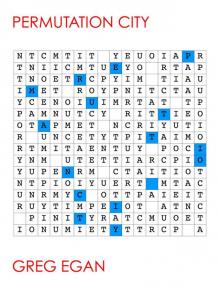 Permutation City
Permutation City The Eternal Flame
The Eternal Flame Artifacts
Artifacts Wang's Carpets
Wang's Carpets Dichronauts
Dichronauts Incandescence
Incandescence Teranesia
Teranesia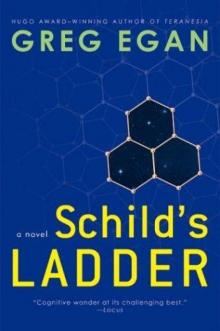 Schild's Ladder
Schild's Ladder Quarantine
Quarantine The Four Thousand, the Eight Hundred
The Four Thousand, the Eight Hundred The Clockwork Rocket
The Clockwork Rocket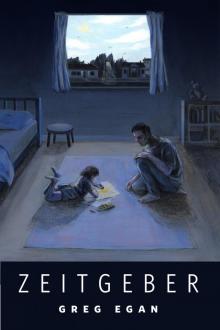 Zeitgeber
Zeitgeber Phoresis
Phoresis The Nearest
The Nearest Diaspora
Diaspora Instantiation
Instantiation Distress
Distress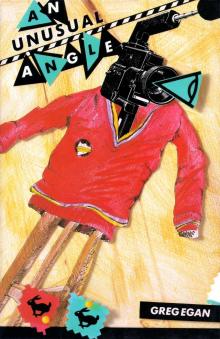 An Unusual Angle
An Unusual Angle Oceanic
Oceanic The Arrows of Time
The Arrows of Time Axiomatic
Axiomatic![Anthology 2. Luminous [1998, 2010] Read online](http://i1.bookreadfree.com/i/03/18/anthology_2_luminous_1998_2010_preview.jpg) Anthology 2. Luminous [1998, 2010]
Anthology 2. Luminous [1998, 2010] Perihelion Summer
Perihelion Summer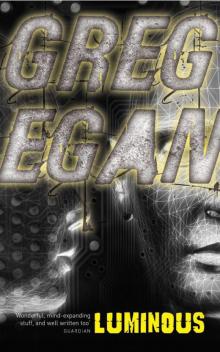 Luminous
Luminous